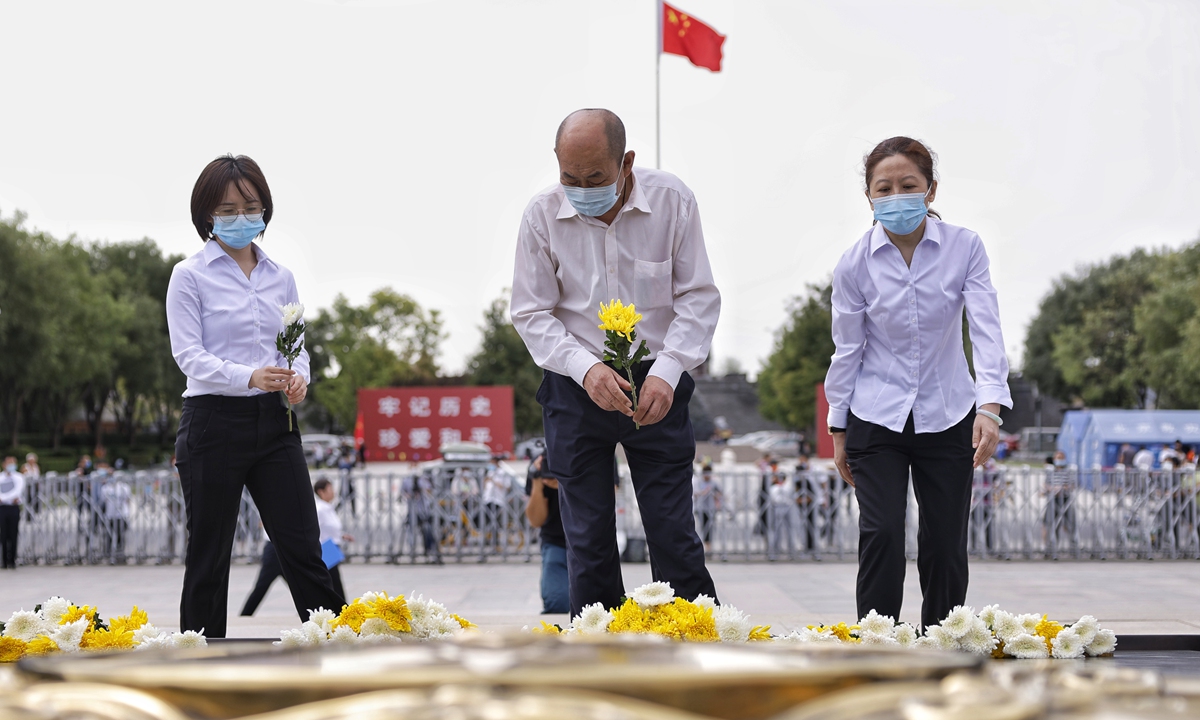In Beijing, at the Museum of the War of Chinese People's Resistance Against Japanese Aggression, staff members and volunteers mourned the martyrs in the anti-aggression war and presented flowers on September 18, 2022. Photo: Li Hao/GT
Air raid sirens were sounded in Chinese cities, newly discovered documents were exhibited in museums, martyrs' cemeteries were visited and heroic stories were recalled on Sunday, the 91st anniversary of the September 18 (9.18) incident, which marked the start of Chinese people's 14-year arduous, courageous and unswerving fight toward the final victory in the War of Resistance against Japanese Aggression (1931-45).
The war has ended, but memories remain vivid in China, which reminded Chinese people as well as those in other victim countries that suffered Japanese invasion and colonization to be alert to Japan's rebounding militarism and recent efforts to disturb regional peace and security as a US proxy.
In Beijing, at the Museum of the War of Chinese People's Resistance Against Japanese Aggression, staff members and volunteers mourned the martyrs in the anti-aggression war and presented flowers. They also sang songs dedicated to that era of history.
The activities were held jointly with the 9.18 History Museum in Shenyang, Northeast China's Liaoning Province, where the incident took place 91 years ago.
In Shenyang, the warning bell was sounded 14 times on Sunday morning to urge people to remember the 14 years of hardships to win the war. Air raid sirens were sounded at 9:18 am to remind people not to forget the humiliation in the past that China bore.
An unspecified brigade of the People's Liberation Army (PLA) on Sunday recommitted its oath to join the army and reviewed stories of its predecessors in fighting the anti-aggression war.
Another PLA brigade stationed in Rizhao, East China's Shandong Province presented wreaths at a local martyrs' cemetery among a series of activities to "remind us to remember the history of fighting and bloodshed, practicing skills and being prepared for battle," said the brigade's instructor Zhang Rong.
The Global Times learned from the Hong Kong Federation of Trade Unions that the federation led a demonstration in front of the Japanese consulate in the Hong Kong Special Administrative Region (HKSAR) , urging the Japanese government to learn from history and uphold a path of peaceful development, restraining its domestic right-wing forces and preventing militarism from reviving again.
Christine Choi Yuk-lin, secretary for education in the HKSAR, said on Sunday that to rethink the past Japanese aggression against China, the scourge of the war to China, and Chinese people's solidarity against the hardships of the Japanese invasion and the patriotic spirit, the education bureau issued learning and teaching resources on the 9.18 incident, including materials for presentations, drama activities and online courses, in a bid to support schools and teachers in organizing activities about learning history and promoting national education.
Lü Chao, a research fellow at the Liaoning Academy of Social Sciences, recalled that large-scale commemorations of the 9.18 incident used to be held mainly in Northeast China, but such activities have been held across China in diverse forms in recent years.
It is important to carry out nationwide commemoration activities as national defense and patriotic education for all, especially for youth, Lü said. Such commemorations are aimed not at Japanese people, but Japan's long absence of deep reflection on its militarist crimes. The activities serve as a channel to express people's emotions against Japan's constant anti-China actions.
Japan has been acting as vanguard in coordinating with the US-led anti-China geopolitical strategy - it is a key pillar and major lobbyist in the Quad mechanism that also includes India and Australia. It also actively embraces and engages Asia-Pacific countries on the US' behalf in the Indo-Pacific Economic Framework in attempt to marginalize China in the supply chain, and the "Chip 4" alliance to strangle China's high tech sector.
According to Lü, Japan always felt that the post-war international order was a constraint and dreamed of getting rid of it, including trying amending the pacifist constitution and upgrading its self-guard forces into a true military.
Observers warned that indulging Japan to continue on a militaristic path, expand its troops and increase its military budgets is dangerous, not only for Northeast Asia and Asia-Pacific but also the world.
When Japanese right-wing politicians make irresponsible remarks on the most sensitive Taiwan question, they do not consider the possible consequences to the hard-won peace, stability and development opportunities that are crucial to the entire Asia-Pacific, they said.
A militaristic Japan is not only harmful in the political and security sense, but also a big troublemaker for regional economic recovery and prosperity when Asia should be an engine in fueling the post-pandemic global economy, Lü said.
Zhu Haoning contributed to the story




